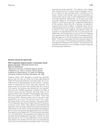 December 2023 in “Azerbaijan Pharmaceutical and Pharmacotherapy J”
December 2023 in “Azerbaijan Pharmaceutical and Pharmacotherapy J” The minoxidil gel could be a better treatment for hair loss than traditional forms.
2 citations,
December 2021 in “Pharmaceutics” Finasteride-loaded proniosomes effectively promote hair growth in mice.
 1 citations,
May 2017 in “InTech eBooks”
1 citations,
May 2017 in “InTech eBooks” Some cosmetic procedures show promise for treating hair loss, but more research is needed to confirm their safety and effectiveness.
 11 citations,
October 2015 in “Clinical and Experimental Dermatology”
11 citations,
October 2015 in “Clinical and Experimental Dermatology” Sophora flavescens extract helps hair growth and treats hair loss.
 27 citations,
August 2018 in “Therapeutic Delivery”
27 citations,
August 2018 in “Therapeutic Delivery” Nanotechnology could make hair loss treatments more effective and reduce side effects, but more research is needed before it's available.
 September 2014 in “Hair transplant forum international”
September 2014 in “Hair transplant forum international” Galenic lotions can effectively treat different patterns of hair thinning in men and women.
August 2022 in “Facial Plastic Surgery Clinics of North America” Noninvasive treatments like minoxidil, finasteride, and low-light laser therapy can help with hair loss.
 7 citations,
January 2021 in “Cureus”
7 citations,
January 2021 in “Cureus” A woman had an allergic skin reaction to a hair loss treatment containing minoxidil and should not use it.
 3 citations,
April 2022 in “Clinical, Cosmetic and Investigational Dermatology”
3 citations,
April 2022 in “Clinical, Cosmetic and Investigational Dermatology” Different methods, including stress management, healthy diet, supplements, and treatments like minoxidil, can help hair grow back after COVID-19 related hair loss.
1 citations,
May 2024 in “International Journal of Molecular Sciences” Adenosine receptors could be promising targets for treating inflammatory skin diseases like psoriasis.
 21 citations,
November 2012 in “Plastic and Reconstructive Surgery”
21 citations,
November 2012 in “Plastic and Reconstructive Surgery” Both genetic and lifestyle factors significantly affect female hair loss.
 October 2023 in “Current Issues in Molecular Biology”
October 2023 in “Current Issues in Molecular Biology” The YH complex, made from Astragalus membranaceus and Cinnamomum cassia, may help treat hair loss by promoting hair growth and follicle development.
 June 2023 in “British journal of dermatology/British journal of dermatology, Supplement”
June 2023 in “British journal of dermatology/British journal of dermatology, Supplement” Congenital alopecia areata may have genetic links and topical corticosteroids are an effective treatment.
 16 citations,
June 2021 in “Journal of Dermatological Treatment”
16 citations,
June 2021 in “Journal of Dermatological Treatment” Minoxidil effectively treats hair loss, especially androgenetic alopecia, but needs more research for better understanding.
 7 citations,
March 2021 in “Evidence-based Complementary and Alternative Medicine”
7 citations,
March 2021 in “Evidence-based Complementary and Alternative Medicine” Nelumbinis Semen extract helps hair grow and could prevent hair loss.
 4 citations,
September 2020 in “BioMed Research International”
4 citations,
September 2020 in “BioMed Research International” Timosaponin BII, a plant extract, was found to promote hair growth in mice, similarly to minoxidil.
 86 citations,
September 1977 in “BMJ”
86 citations,
September 1977 in “BMJ” Minoxidil effectively controls blood pressure in severe cases, but has serious side effects and causes hair growth in women.
 8 citations,
April 2019 in “Dermatologic Therapy”
8 citations,
April 2019 in “Dermatologic Therapy” Tretinoin boosts minoxidil's effect on hair loss by increasing enzyme activity.
1 citations,
August 2021 in “Cosmoderma” Low-dose oral minoxidil is effective and well-tolerated for treating hair loss.
 16 citations,
October 2018 in “Biochemical and Biophysical Research Communications”
16 citations,
October 2018 in “Biochemical and Biophysical Research Communications” Sildenafil, often used for erectile dysfunction, may help hair growth.
July 2021 in “Journal of reports in pharmaceutical sciences” The 2% minoxidil nanosuspension is as effective as the commercial product but safer and easier to use.
 21 citations,
April 2018 in “Journal of Dermatological Science”
21 citations,
April 2018 in “Journal of Dermatological Science” Cilostazol helps hair grow by making hair root cells grow faster and changing growth factor levels.
12 citations,
January 2020 in “Indian Dermatology Online Journal” Female pattern hair loss has multiple causes and treatments, with new therapies showing promise.
 66 citations,
July 2007 in “Journal of Molecular Medicine”
66 citations,
July 2007 in “Journal of Molecular Medicine” Stress increases certain chemicals in the skin and nerves, which might worsen skin conditions.

Hair loss can cause significant social and emotional issues, especially for women and young men.
 8 citations,
January 2016 in “European Journal of Plastic Surgery”
8 citations,
January 2016 in “European Journal of Plastic Surgery” PRGF treatment is safer and more effective for hair loss than topical minoxidil.
 1 citations,
July 2017 in “Clinical research in dermatology”
1 citations,
July 2017 in “Clinical research in dermatology” Hair loss, known as Androgenetic Alopecia, is often caused by hormones and can be diagnosed using noninvasive techniques. Treatments include topical minoxidil and oral finasteride, with new treatments being explored. There may also be a link between this type of hair loss and heart disease risk.
 1 citations,
January 2017 in “Elsevier eBooks”
1 citations,
January 2017 in “Elsevier eBooks” The document concludes that new treatments for hair loss may involve a combination of cosmetics, clinical methods, and genetic approaches.
 29 citations,
December 1998 in “Seminars in Cutaneous Medicine and Surgery”
29 citations,
December 1998 in “Seminars in Cutaneous Medicine and Surgery” New treatments for hair loss show promise, especially finasteride for men and a stronger minoxidil formula.
 27 citations,
September 1992 in “The Lancet”
27 citations,
September 1992 in “The Lancet” ICL is a condition with low CD4+ T cells like AIDS but not caused by HIV, and normal CD4+ T cell counts may vary between men and women.
























